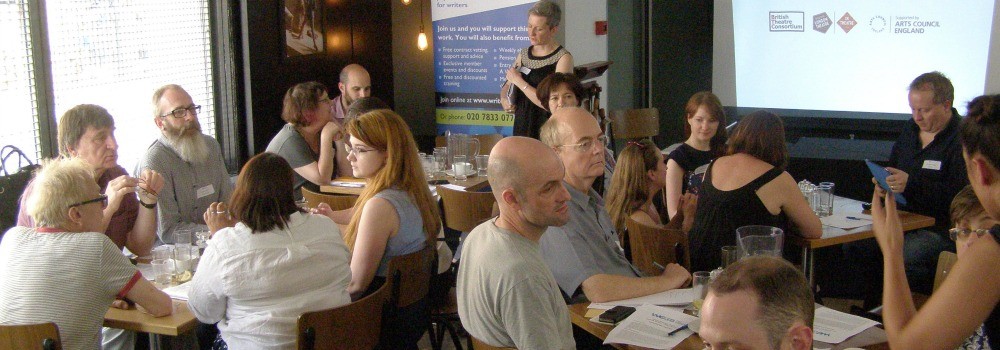By John Morrison
That was the question that faced WGGB’s annual forum of theatre literary managers (pictured above), hosted by the Almeida theatre in Islington, London, on 3 July 2015.
The choice of theme was prompted by surprising evidence published in May this year, which showed that in 2013 women writers contributed only 31% of plays staged in UK theatres. When it came to performances and attendances, the female share was even lower. Plays by women writers accounted for only 13% of box office takings.
The report on British Theatre Repertoire was the work of the British Theatre Consortium, a group which includes Writers’ Guild Theatre Committee Co-Chair and former President David Edgar, and academic, playwright and Guild member Dan Rebellato. The research was supported by the Arts Council.
It analysed statistics supplied by Society of London Theatre and UK Theatre members (covering almost all building-based theatres, and many touring companies and theatres outside London) to deliver a pioneering pilot study which may become annual.
“This is a snapshot of 2013 in theatre,” Dan Rebellato told the forum. To build up a true picture, the report had to strip out “jazz evenings, poetry readings, Jonathan Agnew in person and that sort of thing,” he explained.
With a bit more statistical trimming, the authors arrived at some figures for what they termed “straight theatre”, removing pantomime, opera, musicals and ballet, leaving in just plays and devised work. Within this sector, new work has overtaken revivals – probably for the first time since the 19th century. “New work is dominating the repertoire,” Rebellato said, “and that is a really interesting story that we didn’t expect.”
Another real surprise came in the figures for gender balance. With a number of high-profile works by women writers such as Lucy ‘Enron’ Prebble, Lucy ‘Chimerica’ Kirkwood and Laura ‘Posh’ Wade achieving West End success, the report’s authors expected to see a big shift away from male domination since the Arts Council’s 2009 report Writ Large.
Instead, the proportion of plays written by women writers had barely shifted; not only did plays by women represent only 31% of productions, but, also, had shorter runs in smaller theatres and earned less at the box office. Even translations and adaptations, which are mostly commissioned (and thus in the theatre’s gift), showed the proportion of women authors lagging behind.
The discussion, led by West Midlands-based writer and WGGB member Sarah Woods, sought to delve further into the reasons for gender imbalance. Were fewer women than men submitting plays? Did women suffer from a lack of confidence, or a failure to deliver commissioned scripts, or did they suffer a higher ‘attrition rate’ in the journey from page to stage?
Reactions from the literary managers – who were mostly female – suggested that, at the entry level, women writers now outnumber men. Suzanne Bell of Manchester’s Royal Exchange Theatre reported that 53% of writers submitting to the 2013 Bruntwood playwriting competition, the UK’s largest, were women. Some suggested that while most literary managers were now female, artistic directors took the final decisions, and most of them were male. Sarah Woods reported that most new writing competitions and some theatres were now anonymising their script reading process to ensure all plays are judged solely on their merits.
Are women writing ‘the wrong sort of plays’? That question was asked but got few answers. Was there still a dated perception that women could not write about big political subjects, or were incapable of writing comedy? The debate moved on to discuss translations and adaptations, and the equally dated idea that male writers often got commissioned because they were seen as ‘a safe pair of hands’ or were on a list of ‘go-to’ playwrights.
While the Garrick Club in London’s Theatreland still bans women members, the theatre profession as a whole prides itself on being gender-neutral. Many literary managers said the debate would make them more aware of the need to focus on gender balance and count carefully the proportion of scripts submitted and developed by women writers. Citing the commitment by Headlong Theatre to implement a 50/50 gender balance in commissioned plays, many participants agreed that commissioning quotas were the most positive way forward.
David Edgar reminded the forum that thanks to the Guild, all theatres were obliged to sign contracts that ensured playwrights couldn’t be bullied: they have the right to be consulted over casting, to protect the integrity of their script, and to attend rehearsals. Sarah Woods summed up by looking ahead to 2020: “Over five years can we make the theatre world a more equal and representative place?”
Photo: John Morrison

